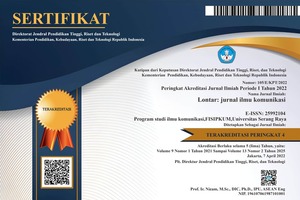Group Communication Patterns of Universitas Terbuka Students’ Online Community on WhatsApp
DOI:
https://doi.org/10.30656/lontar.v13.i1.10294Keywords:
computer-mediated communication, group communication pattern, online community, distance learningAbstract
This qualitative constructivist research focuses on understanding the group communication patterns that emerged from interaction within distance learning student’s online community. Although distance learning has allowed students to pursue higher education without being bound by time and space constraints, this learning mode also separates students from one another. Communication technology, such as the instant messaging platform WhatsApp, becomes an option for students to replace in-person interaction with virtual interaction. This research uses DeVito’s concept of group communication patterns to analyze the communication between students as a member of an online community on WhatsApp group chat. Based on the online observation data and interviews, this research has found that two group communication patterns emerged from the online community interaction: wheel pattern communication and star pattern communication. The patterns themselves depend on the conversation topic between group members. Wheel pattern typically emerges in a Q&A type of conversation where one member would ask questions and receive responses from multiple group members. Meanwhile, star pattern communication is found only in conversations related to sharing personal experiences as distance learning students.
References
Adnan, I., & Iskandar, D. (2021). Analisis Media Siber Pola Komunikasi dan Budaya Komunikasi Pada Komunitas The Podcasters di Media Sosial Discord. Jurnal Komunikasi Universitas Garut: Hasil Pemikiran Dan Penelitian, 7(2), 678–686. www.journal.uniga.ac.id678
Agyekum, B., Asamoah, M. K., & Kissi, E. F. (2023). Promoting Distance Education Scholarships by Fostering a Sense of Community Belonging. International Journal of Adult, Community and Professional Learning, 30(2), 41–63. https://doi.org/10.18848/2328-6318/CGP/v30i02/41-63
Asih, I. W. (2017). Social Presence among Distance Learners: Portrait of Online Communication (Vol. 3, Issue 1). https://www.researchgate.net/publication/376170496
Brown, R. E. (2001). The Process of Community-Building in Distance Learning Classes. JALN, 5(2), 68849–1340. https://doi.org/10.24059/olj.v5i2.1876
Brown, S. (2023). Online, Distance, Blended. It’s All Just Education. In L. Amrane-Cooper, D. Baume, S. Brown, S. Hatzipanagos, P. Powell, S. Sherman, & A. Tait (Eds.), Online and Distance Education for a Connected World (pp. 1–12). UCL Press.
Cannell, P., & Voce, J. (2023). The Student Voice. In L. Amrane-Cooper, D. Baume, S. Brown, S. Hatzipanagos, P. Powell, S. Sherman, & A. Tait (Eds.), Online and Distance Education for a Connected World (pp. 19–34). UCL Press.
Chatterjee, R., & Correia, A. P. (2020). Online Students’ Attitudes Toward Collaborative Learning and Sense of Community. American Journal of Distance Education, 34(1), 53–68. https://doi.org/10.1080/08923647.2020.1703479
Costello, L., McDermott, M.-L., & Wallace, R. (2017). Netnography: Range of Practices, Misperceptions, and Missed Opportunities. International Journal of Qualitative Methods, 16. https://doi.org/10.1177/1609406917700647
Creswell, J. W., & Creswell, J. D. (2023). Research Design: Qualitative, Quantitative, and Mixed Methods Approaches (6th ed.). SAGE Publications.
Croft, N., Dalton, A., & Grant, M. (2010). Overcoming Isolation in Distance Learning: Building a Learning Community through Time and Space. Journal for Education in the Built Environment, 5(1), 27–64. https://doi.org/10.11120/jebe.2010.05010027
Denis McQuail. (2010). McQuail’s Mass Communication Theory (6, Ed.). SAGE Publications.
DeVito, J. A. . (2015). Human communication : the basic course. Pearson Education.
Farrell, O., & Brunton, J. (2020). A balancing act: a window into online student engagement experiences. International Journal of Educational Technology in Higher Education, 17(1). https://doi.org/10.1186/s41239-020-00199-x
Hebert, H. S., Dye, C. K., Lauber, D. E., Roy, D. P., Harden, V., Wrye, B. A., Harris, A., Hendrix, S. P., Sheehan-Smith, L., & Zhang, H. (2023). Connecting Online Graduate Students to the University Community. Journal of Higher Education Theory and Practice, 23(2), 191–202. https://doi.org/10.33423/jhetp.v23i2.5815
Joseph B. Walther, Brandon Van Der Heide, Artemio Ramirez, Jr., Judee K. Burgoon, & Jorge Pena. (2015). Interpersonal and Hypersonal Dimensions of Computer-Mediated Communication. In S. Shundar (Ed.), The Handbook of the Psychology of Communication Technology (pp. 1–22). John Wiley & Sons, Inc.
Keyton, J. (2022). Defining Groups. In S. Beck, J. Keyton, & M. Poole (Eds.), The Emerald Handbook of Group and Team Communication Research (pp. 25–32). Emerald Publishing.
Kozinets, R. (2015). Netnography: Redefined. SAGE Publications.
Kramer, M., & Zanin, A. (2022). Qualitative Methods for Studying Group Communication. In S. Beck, J. Keyton, & M. Poole (Eds.), The Emerald Handbook of Group and Team Communication Research (pp. 73–88). Emerald Publishing.
Maylya, M., Priyowidodo, G., Joanne Tjahyana, Lady, Ilmu Komunikasi, P., & Kristen Petra Surabaya, U. (2018). Pola-pola Komunikasi dalam Komunitas Virtual Pengemudi Transportasi Online. Jurnal E-Komunikasi, 1–10.
Mulyono, H., Suryoputro, G., & Jamil, S. R. (2021). The application of WhatsApp to support online learning during the COVID-19 pandemic in Indonesia. Heliyon, 7(8). https://doi.org/10.1016/j.heliyon.2021.e07853
Pinchbeck, J., & Heaney, C. (2022). Case report: The impact of online forum use on student retention in a level 1 distance learning module. Athens Journal of Education, 9(1), 103–118. https://doi.org/10.30958/AJE.9-1-7
Prodgers, L., Travis, E., & Pownall, M. (2023). “It’s hard to feel a part of something when you’ve never met people”: defining “learning community” in an online era. Higher Education, 85(6), 1219–1234. https://doi.org/10.1007/s10734-022-00886-w
Shepherd, C. E., Bolliger, D. U., & McKim, C. (2024). Online University Students’ Perceptions of institution and Program Community and the Activities that Support Them. Online Learning Journal, 28(1), 216–240. https://doi.org/10.24059/olj.v28i1.3673
Tjahyana, L. J. (2021). Studi Netnografi Pola Komunikasi Jaringan Komunitas Cryptocurrency Dogecoin Pada Twitter. Jurnal Komunikatif, 10(1), 16–37. https://doi.org/10.33508/jk.v10i1.3188
Downloads
Published
Issue
Section
License
Copyright (c) 2025 LONTAR: Jurnal Ilmu Komunikasi

This work is licensed under a Creative Commons Attribution 4.0 International License.
By submitting an article to the journal, the author(s) agree to transfer the published article's copyright to the journal, which will act as the publisher. This means the journal will have the right to publish the article in various forms, including reprints. The journal will maintain the publishing rights to the published articles.
In line with the license, authors and third parties (readers, researchers, and others) are allowed to share and adapt the material. In addition, the material must be given appropriate credit, provided with a link to the license, and indicated if changes were made. If authors remix, transform, or build upon the material, authors must distribute their contributions under the same license as the original.





